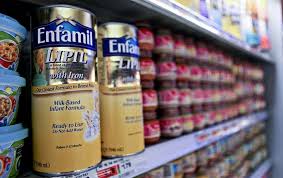Mead Johnson: Baby Formula and Bribes
 Last week, the SEC announced a settlement of an FCPA enforcement action for $12 million against Mead Johnson Nutrition for payment of bribes in China to health care professionals at state-owned hospitals. Mead Johnson’s illegal payments were intended to increase referrals by Chinese physicians and healthcare officials of Mead Johnson products, and obtain access to marketing and personal information about expectant and recent mothers.
Last week, the SEC announced a settlement of an FCPA enforcement action for $12 million against Mead Johnson Nutrition for payment of bribes in China to health care professionals at state-owned hospitals. Mead Johnson’s illegal payments were intended to increase referrals by Chinese physicians and healthcare officials of Mead Johnson products, and obtain access to marketing and personal information about expectant and recent mothers.
Over a five-year period, Mead Johnson paid approximately $2 million in illegal payments to Chinese healthcare professionals.
Mead Johnson funded the bribes by giving its distributors allowance funds that marketed and sold Mead Johnson’s products. While the money was awarded to Mead Johnson’s distributors, employees exerted control over the spending and use of the funds.
The SEC’s case is yet another in the healthcare industry built on the finding that physicians and other medical staff at state-owned hospitals are “foreign officials” for purposes of the FCPA. The legal issue surrounding state-owned entities and coverage under the FCPA is more than resolved, and FCPA compliance programs are often built on this basic assumption under the law.
The interesting aspect of the Mead Johnson case, however, relates to the fact that an internal investigation conducted in 2011 did not uncover evidence of the bribery scheme. The company received an allegation of improper payments in China and investigated the matter but found that it was not substantiated.
Two years later, in response to an SEC inquiry, Mead Johnson re-investigated the matter and – lo and behold – discovered the corrupt scheme. This delay in discovery certainly entered into the SEC’s resolution of the case because it underscored Mead Johnson’s inability or lack of desire to uncover potential misconduct.
Mead Johnson’s failure to uncover the scheme underscores the importance of a robust internal investigation in response to a serious complaint. Details about the initial investigation were not disclosed so it is not clear the reasons for the failure to uncover the bribery scheme.
Apparently, in response to the SEC’s inquiry in 2013, Mead Johnson’s internal investigation discovered the corruption scheme, probably because outside counsel conducted the inquiry and uncovered the illegal scheme.
In addition to the circumstances of the internal FCPA investigation, an interesting issue relating to third-party liability was set forth in the factual summary. Mead Johnson provided its distributors with a marketing allowance. That is very common when companies use distributors.
The SEC’s factual statement included a statement regarding Mead Johnson’s control or influence over the use of the marketing funds. Again, that is not surprising. From the factual description, it is not clear whether Mead Johnson’s parent or Chinese subsidiary had actual knowledge of the bribery scheme and intentionally funded it through the marketing allowance.
 Alternatively, Mead Johnson’s liability may reflect a different theory of liability – failure of internal controls. Under this theory of prosecution, Mead Johnson provided a marketing allowance but failed to properly supervise the use of the funds. By failing to monitor or audit the use of the funds, Mead Johnson turned a blind eye to potential risks that the distributor paid improper bribes to the Chinese healthcare officials.
Alternatively, Mead Johnson’s liability may reflect a different theory of liability – failure of internal controls. Under this theory of prosecution, Mead Johnson provided a marketing allowance but failed to properly supervise the use of the funds. By failing to monitor or audit the use of the funds, Mead Johnson turned a blind eye to potential risks that the distributor paid improper bribes to the Chinese healthcare officials.
Without having access to additional facts, it is not clear exactly whether the case rested on actual knowledge of a bribery scheme being carried out by Mead Johnson’s Chinese subsidiary, or whether Mead Johnson failed to exercise proper supervision of marketing funds that were used improperly by the distributor without actual knowledge that the payments were being used to make illegal payments. In either case, FCPA liability would attach.















